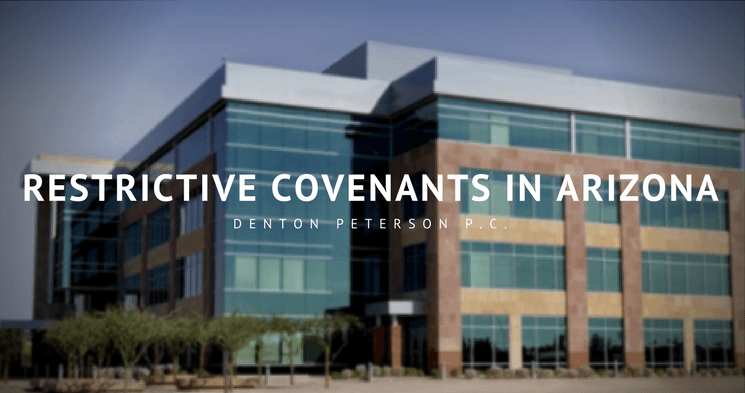Restrictive Covenants in Arizona
Non-Compete Agreements, Non-Solicitation Agreements, and Non-Disclosure Agreements are hot topics within employment law. These are also known as “restrictive covenants” or agreements that in some way restrict an employee from doing something both during and after his/her employment ends with a company. Employers favor these agreements. This is because one of employers’ biggest fears is to hire an employee only to have that employee take his/her training, the employer’s customer list and industry knowledge, and use it to compete against the employer. Employees disfavor these agreements. This is because employees feel as though it restricts their ability to earn a living if they either quit, or if they are fired from employment by an employer.

While it is important to understand the feelings of both employers and employees towards restrictive covenants, the Court is the one who ultimately decides if a restrictive covenant is enforceable. As with all law, the facts of each case are intricate and one fact can mean a decision being in favor of an employer, or an employee. These frequently asked questions provide a guideline for an employer or an employee when discussing restrictive covenants.
1) What is a non-compete agreement?
Answer: A non-compete agreement is a contract that is meant to bind an employee from working for a competing business both during and after their employment with their current employer.
2) Are non-compete agreements enforceable in Arizona?
Answer: While the Courts do not favor non-compete agreements, they are enforceable so long as they are 1) reasonable as to geographic scope, 2) reasonable as to duration of time, and 3) narrowly defined to limit activities that you performed for the employer.

If however X Company has Bob sign a non-compete that limits him from working for a direct competitor to X Company (that sells the same software as X Company) for six months and limits the geographic scope to just the United States, the court is more likely to enforce this type of non-compete.
3) What is a non-solicitation agreement?
Answer: Non-solicitation agreements restrict an employee from contacting either clients or employees of their employer once employment has ended.
4) Are non-solicitation agreements enforceable in Arizona?

Example: Bob works for X Company which is in the business of selling software to users in the United States. X Company has Bob sign a non-solicitation clause which prohibits him from contacting any current, past, future, or potential client that could ever come to X Company for software for the space of 10 years. Because this limits Bob beyond just those he had contact with and for 10 years, it is likely that the court would not enforce this non-solicitation agreement.
If however X Company has Bob sign a non-solicitation agreement that limits him from contacting any past or current clients of X Company for the space of 1 year, with whom he had any interaction during his employment with X Company, then the court is more likely to enforce this non-solicitation agreement.
5) What is a Non-Disclosure Agreement?

Answer: a non-disclosure agreement is a document in which a company outlines what it believes is confidential/proprietary to its business and requires an employee to agree not to share that information with others either during or after his/her employment.
6) How do the Courts view Non-Disclosure Agreements?
Answer: Non-disclosure agreements are viewed favorably by the courts. This is because it does not limit an individual’s ability to work other than restricting them from using confidential information at a new place of employment. Arizona state law also has provisions that prevent employees from taking proprietary information from an employer and using it later. (See A.R.S. 44-401 et seq)
If you have additional questions about non-compete agreements, non-solicitation agreements, or non- disclosure agreements, please contact Denton Peterson PC.
Approved By:

Brad Denton – Denton Peterson, PC
1930 N Arboleda #200
Mesa, AZ 85213
Office: 480-325-9900
